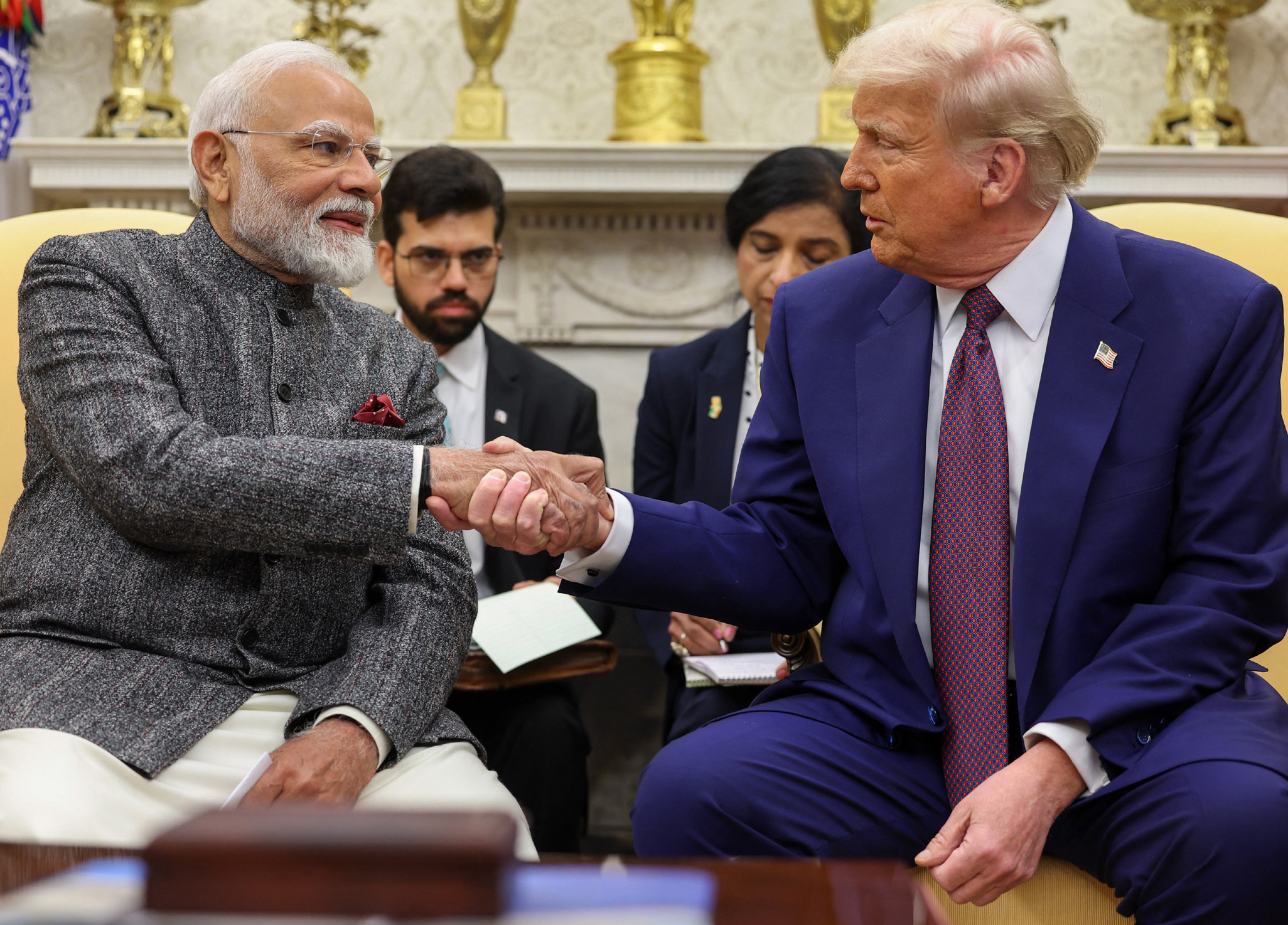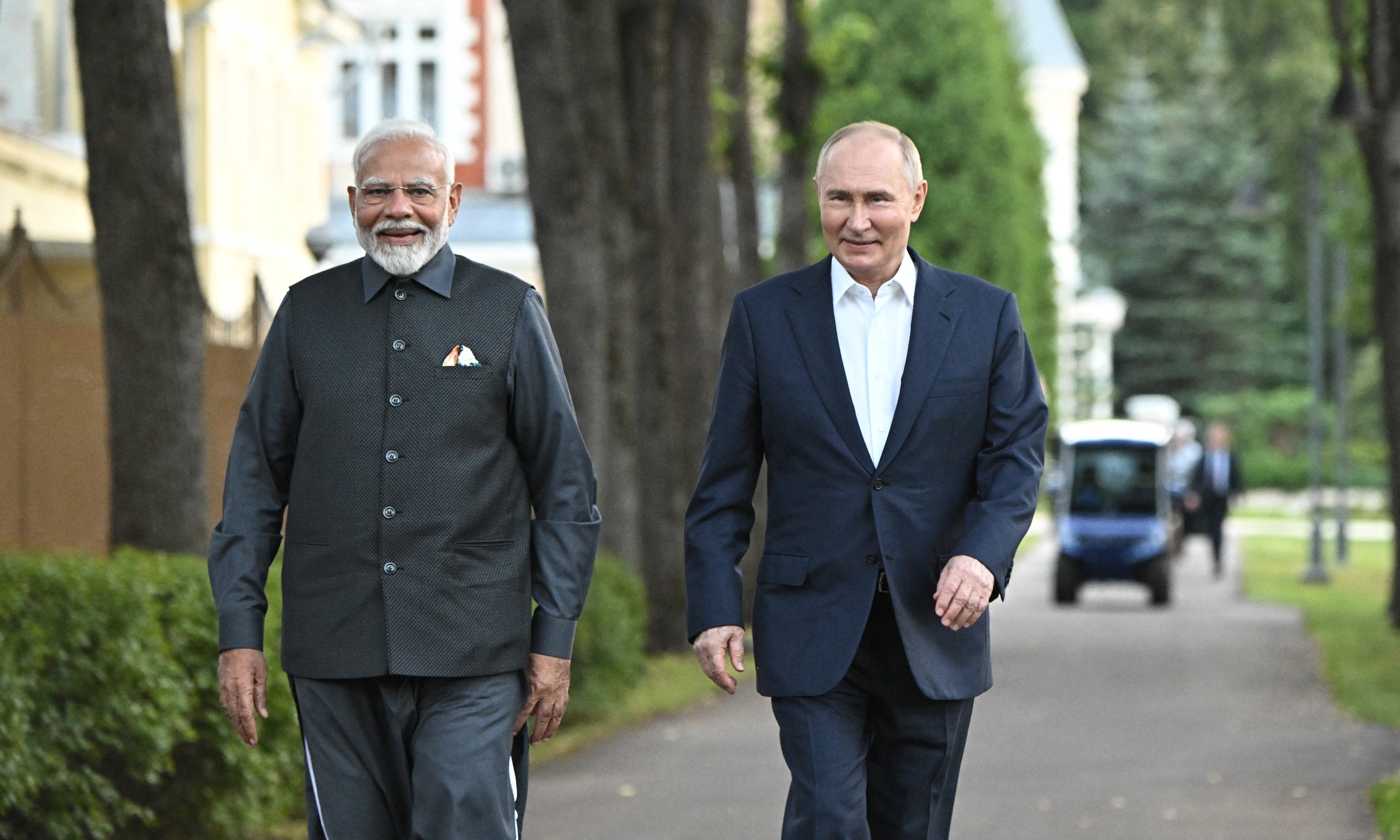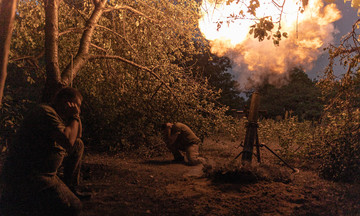On 4/8, former President Donald Trump posted on Truth Social that India "buys a lot of Russian oil" and resells much of it on the open market for profit, disregarding the conflict in Ukraine.
"Therefore, I will significantly increase the tariffs that India must pay to the US," he declared, without specifying the amount. Last week, he announced a 25% tariff on imports from India and emphasized that the world's fifth-largest economy would also face an undetermined penalty for continuing to do business with Russia.
"I don't care what India does with Russia. They can bring down their stagnant economy together, and I won't be bothered," Trump stated in late July.
These recent comments mark a stark shift in Trump's stance towards India. During his first term, Trump visited India in 2020 and affirmed, "America loves India, America respects India."
"We will always remember this magnificent hospitality. From this day on, India will always hold a special place in our hearts," Trump said to a cheering crowd at the Sardar Patel Stadium in Ahmedabad, with Melania Trump by his side.
In February, after returning to office for his second term, Trump hosted Indian Prime Minister Narendra Modi at the White House. During the meeting, Trump praised Modi as a "great negotiator" as Modi echoed Trump's campaign slogan, saying he wanted to "make India great again."
Officials in both Washington and New Delhi had hoped to cultivate bilateral relations based on the positive personal relationship between Trump and Modi. Mike Waltz, former US National Security Advisor and current nominee for US Ambassador to the United Nations, once described US-India cooperation as "the most important relationship of the 21st century."
Subsequently, Director of National Intelligence Tulsi Gabbard and Vice President JD Vance also made high-level visits to New Delhi to strengthen bilateral ties.
 |
Trump and Modi met at the White House in 2/2025. Photo: AFP |
Trump and Modi met at the White House in 2/2025. Photo: AFP
However, this warmth has cooled in recent months. Observers suggest that cracks in the relationship emerged as the US and Pakistan recently grew closer, including a meeting between Trump and Pakistani Army Chief Asim Munir in June.
"Modi must be very unhappy with that meeting," commented Manoj Joshi, a distinguished fellow at the Observer Research Foundation (ORF) in India.
India and Pakistan are neighbors with a turbulent relationship. In May, the two countries clashed in the disputed Kashmir border region, resulting in the most serious fighting between the two nuclear-armed South Asian nations since 1999.
According to unnamed officials within the Trump administration, the US received intelligence that India had launched a Brahmos cruise missile to strike a target in Pakistan. Washington believes the Brahmos missile, jointly produced by India and Russia, can carry a nuclear warhead, though New Delhi claims it is a conventional weapon.
Fearing an escalation if Pakistan also used its nuclear arsenal, Trump encouraged Vance and Secretary of State Marco Rubio to call their counterparts to discuss the tension.
After several days of fighting, India and Pakistan confirmed a ceasefire agreement. On 10/5, Trump announced on Truth Social that New Delhi and Islamabad had agreed to a ceasefire "after a long night of US-mediated negotiations." A White House official stated that Trump leveraged his relationships with both India and Pakistan to secure the ceasefire.
Pakistan credited Trump, suggesting he should be nominated for the Nobel Peace Prize for helping avert a potential nuclear war between Pakistan and India.
Meanwhile, New Delhi has never acknowledged Washington's mediating role. India even expressed displeasure with Trump's statements and insisted that no outside power intervened in the ceasefire.
Observers say India's claim that Trump inflated the US role in the ceasefire agreement angered the former president. He told aides he was annoyed with Modi for not thanking him, according to sources.
Trump further strained relations with New Delhi by offering to mediate the long-standing Kashmir dispute between India and Pakistan.
"That annoyed India. The country has long rejected the idea of third-party mediation, which Pakistan desires. If it were just the 10/5 post, the relationship could have recovered. However, Trump has repeatedly spoken about the US helping to bring about the ceasefire," said Lisa Curtis, a former senior official on the US National Security Council who oversaw South Asia policy during Trump's first term.
Besides the Pakistan issue, India's relationship with Russia has also irked the US. India, considered by the US as a key ally in South Asia, has increasingly strengthened ties with Russia. New Delhi buys oil and weapons from Moscow, thereby supporting the Russian economy, which is under pressure from Western sanctions.
 |
Russian President Putin (right) and Indian Prime Minister Modi stroll at the residence in Novo-Ogaryovo, outside Moscow, on 8/7/2024. Photo: AFP |
Russian President Putin (right) and Indian Prime Minister Modi stroll at the residence in Novo-Ogaryovo, outside Moscow, on 8/7/2024. Photo: AFP
Taking a harder line against Russia for not ending the conflict in Ukraine, Trump declared he would impose tariffs on countries trading with Moscow. He said India would face "penalties" for continuing to buy Russian goods.
India imports a large quantity of military equipment from Russia. From 2006-2010, such imports from Russia accounted for 82%. Although India has recently sought to reduce its dependence on Moscow, it still imported 36% of its military equipment from Russia between 2020 and 2024. This makes Moscow the country's largest arms supplier, according to the Stockholm International Peace Research Institute.
In addition to weapons, oil is another point of contention, with Trump criticizing India for "buying too much Russian oil" while many Western countries have stopped or limited purchases.
India is the world's third-largest oil importer and consumer, with Russia being its largest supplier, accounting for about 35% of its supply. In the first half of this year, India imported about 1.75 million barrels of Russian oil per day, a 1% increase compared to the same period in 2024, according to data compiled by Reuters.
"That's certainly a point of irritation in our relationship with India, though not the only one. While there are many other suppliers, India continues to buy too much from Russia," Secretary of State Rubio told Fox News last week, adding that this gives Russia more revenue and "allows them to continue the war in Ukraine."
Ashley Tellis, a senior fellow at the Carnegie Endowment for International Peace, said that while the US reaction to India's purchase of Russian oil is not the main cause of the current tension between the two countries, it "certainly creates more problems with New Delhi."
At a press conference on 1/8, Indian Foreign Ministry spokesperson Randhir Jaiswal said the country has a "stable and long-standing partnership" with Russia. "For our energy import needs, we consider market availability as well as the global situation and context," he said.
Stalled trade agreements between the two countries have also contributed to the cooling relationship. Several current and former officials said Trump was deeply disappointed by the lack of progress on a bilateral trade deal between the US and India.
A point of contention in the tariff negotiations is the US push to open India's agricultural market, a sector that employs 40% of the country's workforce.
However, opening up this long-protected sector would anger Indian farmers, an influential voting bloc, and antagonizing them could pose significant political risks for Modi. In 2021, he was forced to abandon an attempt to repeal agricultural regulations after facing nationwide farmer protests.
Trump has criticized India's trade barriers as "tense and annoying." The tariff imposed by the US government on India since 30/7 is 25%, only 1% lower than the "liberation day" tariff announced in April. Meanwhile, the tariff applied to Pakistan is 19%.
India said it remains focused on the substantive agenda both countries have committed to, expressing "confidence that the relationship will continue to grow." However, Indian Foreign Ministry spokesperson Jaiswal acknowledged that the US-India relationship is "undergoing changes and challenges."
Thuy Lam (According to WSJ, FT)












